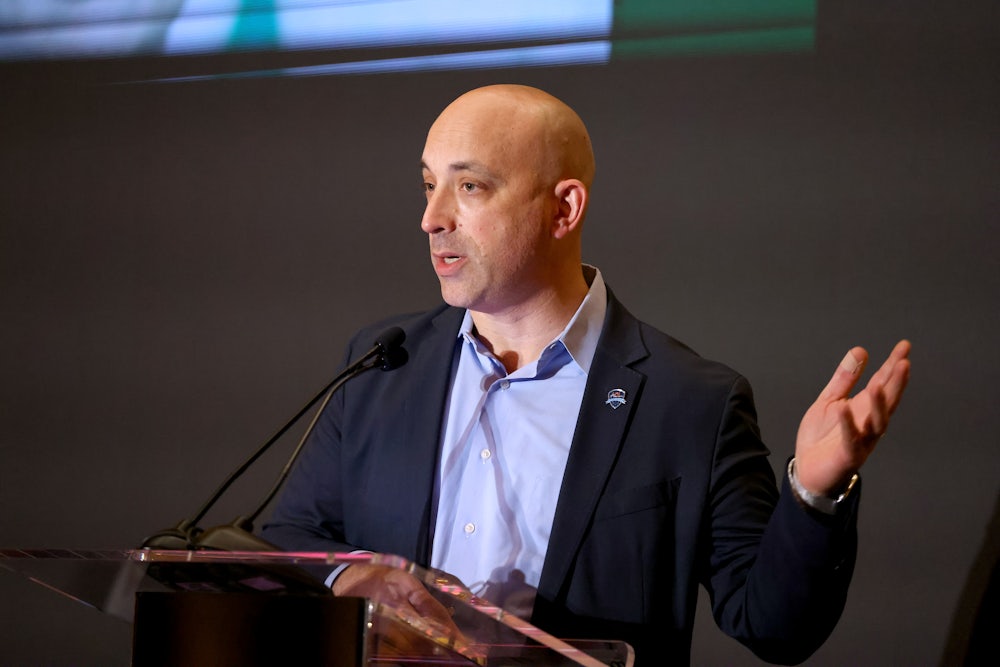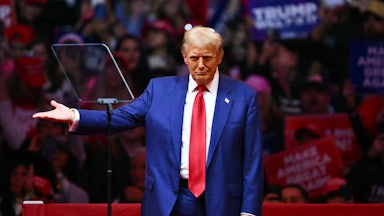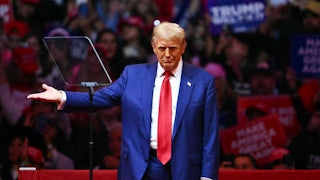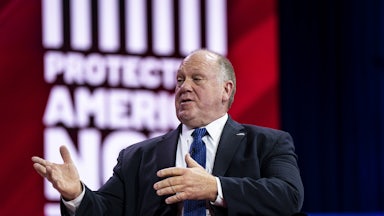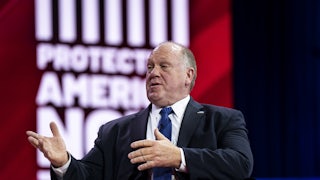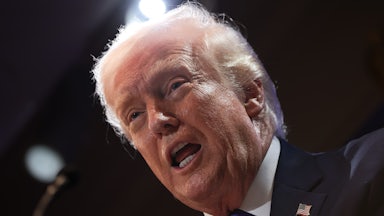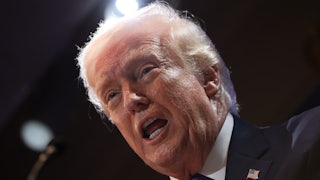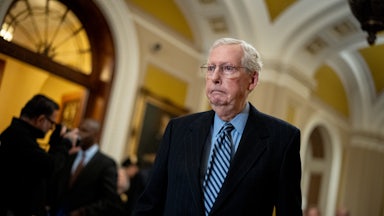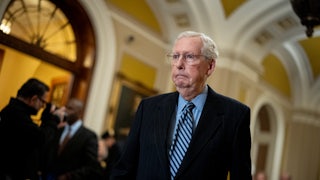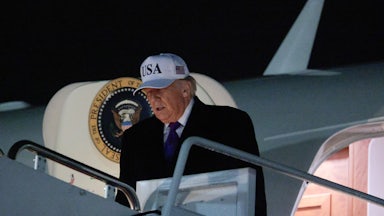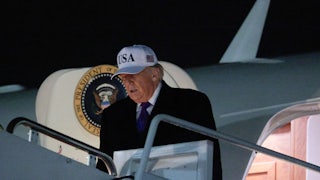From the minute Donald Trump announced his plan to stage a campaign rally in Madison Square Garden, it invited comparisons to the pro-Hitler rally held there by American Nazis in 1939. If that might have been an unfair allusion to make ahead of the event, the actual substance of his Sunday gathering in the heart of New York City laid such concerns to rest: By the time Trump had even hit the stage, in fact, what had transpired successfully evoked that predecessor movement much more explicitly than even Trump’s harshest critics might have imagined.
There were the racist statements targeting Puerto Ricans, Latinos, Black people, Palestinians, and Jews; the description of Vice President Kamala Harris as a “Samoan, Malaysian, low IQ” individual; the prominent display of a font regularly used in Nazi campaigning on the hat of Trump’s shadow running-mate, Elon Musk; and the speeches featuring rhetoric used by Adolf Hitler. One of the event’s speakers even described the night as a “Nazi rally” in his own remarks. That’s the language many used to condemn the rally, with over half a million people on Twitter describing it as a “Nazi rally” in the hours after the event.
Conspicuously absent from this condemnation was an organization that one might have hoped to see at the forefront of naming and shaming such dangerous rhetoric: the Anti-Defamation League, or ADL. ADL was founded in the early 1900s to combat antisemitism and “secure justice and fair treatment for all,” with a self-described “understanding that the fight against one form of prejudice cannot succeed without battling prejudice in all forms.” On its website, the organization specifically spotlights how in the 1930s, as the “cloud of Fascism spread across Europe, inspiring sympathetic homegrown movements in America,” ADL singled out the “pro-Nazi agitation of the German American Bund”—the organization that held the original Nazi rally at Madison Square Garden.
So how, with all that storied history behind it, did ADL respond to Trump’s 2024 Nazi rally? “Political rallies should be about politics and policy, not offensive jokes,” the organization wrote, in a bizarrely anodyne message that did not even name the presidential candidate for whom the rally was held.
This response was so pathetic it actually inspired criticism from ADL’s former leader, Abe Foxman—who is, to put it mildly, not a leftist. Foxman condemned Trump’s MSG rally as dangerous, writing that “the gas chambers in Auschwitz did not begin with bricks, they began with words, ugly, hateful words against Jews and other minorities.” And he went on to extend his criticism to “the American Jewish Committee, ADL, Conference of Presidents, the federations, all these institutions” for refusing to call out Trump by name for his dangerous rhetoric and actions.
This refusal by mainstream Jewish institutions is not a one-off failure. Even before Trump’s MSG rally, many in the Jewish community were horrified at ADL’s silence in response to reporting that Trump’s own White House chief of staff and chairman of the Joint Chiefs of Staff described the former president as a “fascist to the core” who on multiple occasions spoke admiringly of Adolf Hitler. This silence stood in sharp contrast to ADL’s approach on other issues; indeed, in the day following the report on Trump’s pro-Hitler sentiments, ADL saw fit to share eight Twitter posts naming and condemning as antisemitic various undergraduate organizations—primarily Jewish-led groups—engaged in protests against Israel’s brutal war in Gaza, as well as one post calling out media personality and webcam model Mia Khalifa. Yet ADL still has not commented on the fact that a candidate for president who may win control over the executive branch of the U.S. government next week (or, barring that, move for a second time to illegally seize control) is an open admirer of Adolf Hitler.
Though this would be shameful enough, ADL’s culpability in this moment goes even deeper, for it is not merely staying silent on the threat Trump poses—the organization’s current leader, Jonathan Greenblatt, is actively carrying water for Trump by echoing his lieutenants’ efforts to shut down comparisons between the MAGA movement and the Nazis.
For example, Greenblatt recently called out Mehdi Hasan for saying that if people on the far right don’t want to be called Nazis, they should stop acting like them. Hasan made this reference during the now-viral CNN panel discussion in which far-right commentator Ryan Girdusky told Hasan he hoped his “beeper doesn’t go off,” implying—with an insinuation of violence—that Hasan was a terrorist for supporting Palestinians.
Though Greenblatt rightfully condemned Girdusky’s comment, he went on to immediately both-sides the exchange, saying, “It was also unacceptable for [Hasan] to make a Nazi analogy. Such comparisons are inaccurate, offensive and dishonor the memory of the six million Jews slaughtered by the Third Reich and the millions of others who also were murdered by the Nazi regime. Argue about politics and policy all day long; leave Holocaust comparisons out of it.”
Greenblatt’s statement is eerily similar to one made by Trump’s mass deportation czar, Stephen Miller. During Trump’s rally on Sunday, Miller said, “America is for Americans and Americans only,” a line that precisely parallels a quote Hitler made in 1934 that “Germany is for Germans and Germans only.” When this was pointed out, Miller responded by saying the comparison “trivializ[ed] the Holocaust” and was “a grave insult to my Jewish brothers and sisters who were murdered by Nazis.”
Greenblatt and Miller are making the same basic argument here, relying on the same intellectually bankrupt sleight of hand—namely, an insistence that a comparison to Nazis is necessarily a comparison to the fully realized horrors of the Holocaust, and somehow demeaning to its victims.
In neither of the cases above, nor any other analogy I’ve seen between Trump’s movement and the Nazis, is there any implication that the criticized behavior or rhetoric is as bad as the Holocaust. To insist that this is the necessary meaning of such a reference is to claim that it is only appropriate to make a Nazi comparison if the compared group or leader has already killed millions of Jews. This is a patently absurd premise—by Greenblatt and Miller’s logic, the Nazis themselves could not be described as Nazis prior to 1940, and sounding the alarm about their program in the 1930s, before Hitler began formulating and executing his Final Solution, would have been “inaccurate” and “offensive.”
After all, it was called the “Final Solution” for a reason. The Holocaust came at the end of a long process of intensifying Nazi control—over government authority, cultural institutions, social structures, and more—which began in earnest with Hitler running for president of Germany in 1932. Nobody at that time—or, for that matter, in years immediately after, as Hitler seized dictatorial power and began remaking Germany in his twisted image—knew of the horrors that were to come. Most commentators scoffed at the idea that such horrors were possible. But they were, and they did.
No historical comparison is perfect, because no pair of complex historical events can ever be completely identical. But they don’t have to be. The reason to make a historical comparison is to use lessons learned from the past to shape better outcomes in the present. The most important lesson we can learn from the Holocaust is not that it is evil to murder millions of people; we should know that already. The lesson is that monstrous things can happen if a strongman who demagogues against vulnerable groups and promises to root out the “enemy from within” is allowed to take power. That is exactly the situation we face right now, and it is the responsibility of any leader or institution of moral standing to be clear about the reality of this threat.
So yes, we can and should reference the Nazis when doing so can productively inform our response to contemporary threats of far-right authoritarianism. And as a Jew, and the grandson of a Holocaust survivor, I believe that our mainline Jewish institutions have a particularly acute responsibility to do so. That is why it’s so hard to find words to describe my outrage that institutions like ADL and leaders like Jonathan Greenblatt are cynically using the enormity of the Holocaust to shield Trump from historically informed criticism and mislead the public about the existential threat his candidacy represents.
Of course, we do have one word in our tradition for a Jewish person who collaborated with the Nazis for their own self-interest. But it’s a word I really hate, and will not use here. So instead, I’ll just say this to Jonathan Greenblatt, ADL, and any other Jewish group or leader giving succor to a Hitler-admiring fascist on the eve of this civilizationally historic election: Your shande is dishonoring the memory of our ancestors and our people, and it will not soon be forgotten.
